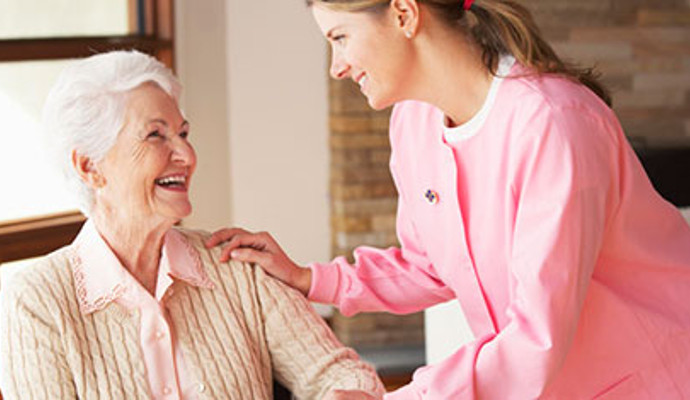What can you do when you or your loved one are stuck at home during an outbreak? How will you manage personal care or picking up groceries? And how will you manage the feelings of isolation and anxiety?
Many of us feel anxious and fearful about COVID-19. If you have an elderly or at-risk loved one, a professional caregiver can help support them and give advice on what you can do to slow the spread of infection. If your needs are minor (but nevertheless important), or are different than what their caregivers provide, you can be referred out to a large local network of a variety of eldercare services.

3 Ways Caregivers Keep Elders Safe and Comforted at Home
One of the recommendations to limit the spread of COVID-19 is physical distancing. Practice physical distancing by avoiding public places and traveling. Stay at home except when absolutely necessary to access essential goods and services, such as food, gas, and medications.
We know for a fact that staying at home reduces your chance of catching or spreading coronavirus. You or your loved ones may find physical distancing especially difficult and isolating. That’s why having a professional caregiver helps achieve these 3 vital goals:
Make it Easier to Stay at Home
The safest place for even relatively healthy elders is often in their own homes. In-home caregivers help to make sure their clients’ needs are met. For example, a home caregiver will help clients stock up on supplies. A home caregiver can assist with a shopping trip. Caregivers can make sure the house is stocked with necessary over-the-counter medicines and supplies to treat fever and other virus or cold symptoms. Home caregivers also can prepare healthy meals.
Provide Companionship
Elders who live alone already are at risk for isolation and loneliness. This is especially true given the rural nature and distances between people in Vermont. Your loved one may feel anxious and disconnected from others during this uncertain time. If you can’t visit, a home caregiver can help your loved one get in touch — and stay in touch — with family and friends. A caregiver can assist with a hobby, help with at-home exercises or setup ways to communicate with loved ones such as writing letters, phoning, or using video calls.
Protect and Reassure Your Loved One
Caregivers are trained in recognizing the warning signs of illness. They are also taught how to prevent the spread of illness and on effective infection control techniques.
A caregiver can assist your loved one with:
- identifying and reporting symptoms
- remembering to regularly wash hands
- reminders to cover a cough or sneeze
- effectively cleaning and disinfecting surfaces
- monitoring medications
- staying hydrated and well nourished
Another excellent option for seniors who need around-the-clock assistance and monitoring, but who have no family locally, is to elect live-in caregiver service. Live-in caregivers, as the name implies, sleep overnight and stay in home typically for shifts of 2-5 days at a time. As coronavirus carriers are often non symptomatic themselves, a strategy of live-in caregivers reduces the senior’s exposure to the outside world because caregivers are not leaving the home as often. Families could even make arrangements for sole caregiver live-in services for 24/7 around the clock presence during a pandemic outbreak.
Being alone during a time of uncertainty can lead to fear and anxiety. Your loved one needs to know that support is available. As a family caregiver you are doing your best to meet the needs of those who depend on you while following safety recommendations. Consider home care as a good fit for keeping your elderly loved one safe while they stay at home.
What is COVID-19 and What are the Symptoms?
COVID-19 is an illness caused by an unusual type of coronavirus germ, first identified in December, 2019, in the Chinese city of Wuhan. If you or a loved one is infected with the coronavirus, you might notice symptoms such as:
- Fever
- Cough
- Shortness of breath
- Difficulty breathing
The people most likely to develop serious symptoms are older adults (whose immune systems are not as robust as younger peoples) and people with compromised immune systems or respiratory systems.
How Does COVID-19 Spread?
COVID-19 spreads from person to person through respiratory droplets. Respiratory droplets can travel about 6 feet through the air, and are spread through:
- Coughing
- Sneezing
- Loud talking
- Blowing your nose
- Touching your mouth, nose, or eyes after touching a contaminated surface
How to Prevent the Spread of COVID-19

The most reliable way to prevent getting sick is to not be exposed to the virus. You can reduce your risk of exposure or spreading the virus: reduce your contact with other people.
Here’s how:
- Remain at home and avoid contact with other people
- Avoid gatherings of more than 10 people
- Avoid travelling, shopping and social visits if possible
- Use a drive-thru, takeout or delivery instead of eating at restaurants
- Avoid touching your eyes, nose and mouth
- Clean and disinfect objects and surfaces that people touch or use often
- Wash your hands often with soap and water for at least 20 seconds
- Maintain extra physical space (at least 6 feet) between yourself and other people if you must go out
If you feel ill:
- Stay at home
- Call your medical provider
- Postpone visits to residents of nursing facilities, retirement communities, and assisted-living buildings
- Cover your mouth and nose with a facial tissue when you sneeze or cough — and immediately discard the tissue, then wash your hands
- Wear a facemask when around other people
Tom Lee is the owner of Home Care Assistance of Greater Burlington located in Essex Junction, Vermont. He can be contacted at 802-876-7258 or tlee@homecareassistance.com. Visit his website at HomeCareAssistanceBurlingtonVT.com.
Resources
Centers for Disease Control and Prevention: Coronavirus (COVID-19)
Centers for Disease Control and Prevention: People at Risk for Serious Illness form COVID – 19
World Health Organization: Coronavirus
Related Articles & Free Subscription

AARP Warns Against Spread of Coronavirus Scams
Simple Changes to Keep a Home Safe for Aging





Comment here